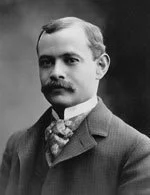The son of Jewish immigrant parents, Louis and Rosalie Peck Tilles, Andrew “Cap” Tilles lost both of them at a very young age. After his mother died, Cap’s father remarried. After Louis’s death, his young, pregnant wife, Cap’s stepmother, relocated to Chicago. New to the country and unable to speak English, she was unprepared to care for five other children who were not her own and placed the children with Fort Smith, Arkansas residents.
Andrew “Cap” Tilles
While the residents of Fort Smith embraced the children, the less than favorable economic conditions in the south after the Civil War left the city residents unable to support all the children. The children spent many years struggling to find appropriate homes and just survive, a situation that left an indelible mark on Cap. He vowed to help other orphan and needy children receive the means to achieve what he always wanted—a self-sufficient and independent life. He believed that any child could flourish with the proper help.
With grit and determination, Cap made a fortune in various business enterprises after relocating to St Louis. He then spent years using that fortune to help others have what he lacked as a child.
He gave parks to St. Louis and Fort Smithson so that children could have a place of recreation. He funded orphanages so that children had a safe living environment. He helped Catholic nuns, similar to those nuns who helped care for his younger sisters. He helped children who faced debilitating illnesses just as his brother Manny had prior to succumbing to tuberculosis at a young age.
He established the Rosalie Tilles Non-sectarian Charitable Fund, now called the Tilles Foundation, to honor his dear mother and achieve his lifelong commitment to help needy children and orphans.
Although the primary objective of the foundation involved educating children, Cap understood that some children also needed medical assistance to become independent. He gave the Trustees discretion on how to do that. Over the years, the Foundation has provided such things as hearing aids, learning assistance and devices, health and welfare support, and therapeutic services to help children become independent.
He also gave the Trustees discretion in how to educate children. As times changed, funding changed—from four-year college to trade school and community college education—to provide children with strong futures and the ability to support their greater communities.
The end result remains the same—to give needy children help so that they can move forward in life and, hopefully, someday help other children by paying it forward.

